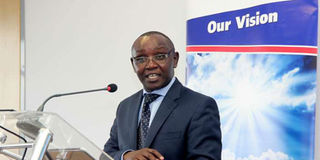System set up to verify journalists' qualifications

Media Council of Kenya (MCK) CEO Haron Mwangi addresses participants during the launch of a media monitoring report at Aga Khan University Graduate School of Media and Communication in Nairobi, on December 2, 2015. MCK has launched a mobile system that authenticates journalists, in an effort to promote ethics in journalism. PHOTO | JAMES EKWAM | NATION MEDIA GROUP
What you need to know:
- On many occasions unscrupulous individuals have taken advantage of the situation to harass and get money and other favours from the public.
- Jane Godia, Managing Editor, African Woman and Child feature Service, said some people masquerade as journalists yet their intention in attending events is to steal.
Media Council of Kenya has launched a mobile system that validates journalists accreditations, in an effort to promote ethics in journalism.
The system, in a bid to check fake journalists, will enable a person to input a journalist's name and accreditation number, found below the barcode of the press card, and send an SMS message to 071500011.
Thereafter, details such as name, media house, position, ID number and the press card’s expiry date will be displayed.
However, it will only present information of journalists registered with the Council.
Launching the new system on Wednesday, at Aga Khan University Graduate School of Media, Kenya Editors Guild Treasurer, Arthur Okwemba said the number will help root out fake journalists from the system.
“The launch of this number (0715000111) is extremely important for the media industry as it will help differentiate between genuine and fake journalists,” he said.
He also urged public to cross check with the system in case they encounter journalists who demand for bribes in their line of duty.
“If a journalist asks for money from you just note the press card number, retrieve his details then pick it up with the media council and his or her supervisors,” said Mr Okwemba.
There have been numerous complaints of people soliciting money in the name of journalists.
WHEAT AND CHAFF
On many occasions unscrupulous individuals have taken advantage of the situation to harass and get money and other favours from the public.
Ms Jane Godia, Managing Editor, African Woman and Child feature Service, said some people masquerade as journalists yet their intention in attending events is to steal.
“Now that we have a number we can use to confirm if a journalist is genuine, it will help those who deal with journalists to identify masqueraders,” said Ms Godia.
To seal loopholes in the accreditation system, the Council has been cleaning its database of registered journalists in conjunction with media stakeholders.
So far the Council has accredited over 5000 journalists.
Out of these, only 2500 are active meaning the rest have either opted out of the industry or are yet to renew their press cards, which is supposed to be done annually.
Local journalists pay Sh2000, foreign journalists, Sh5000 and student Sh300. To replace a lost press card one pays Sh300.





